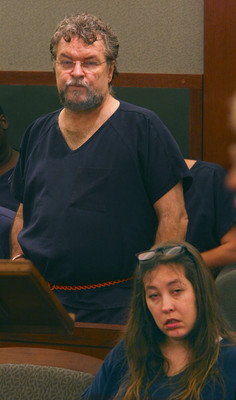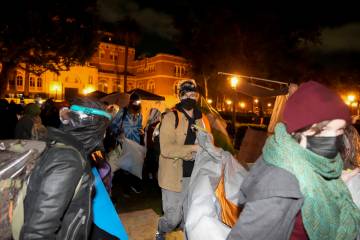Rimer complaints drew no agency interventions
One Rimer son told her about his father calling him the devil and spanking him so hard he couldn't sit.
He told her about getting two slices of bread and water for dinner when he didn't do his chores. Sometimes, he told her, the Rimer children went to bed without any dinner at all.
Despite concerns about what she heard, Traci Washington, then a case worker for Clark County's Child Protective Services, closed the case on a supervisor's order, according to grand jury transcripts obtained late Friday by the Review-Journal.
She testified she felt "somewhat uncomfortable" with the decision in early 2007.
"Clearly it appears that there is some type of abuse, either emotional or he's borderline abusive in the sense that he does just enough, you know, he's not starving the kids," she told the grand jury about the father, Stanley Rimer. "He gives them water and milk. And there appeared to be some emotional abuse."
Sixteen months later, the youngest and most vulnerable child in the family, Jason Rimer, died after being left in a sport utility vehicle for 17 hours. The June 9 death of the 4-year-old, who had a genetic disease that crippled his body and his mind, led to the grand jury that indicted Stanley Rimer and his wife, Colleen, last month on charges including second-degree murder and child neglect of their four other minor children, ages 9 to 15.
The children lived in a filthy home littered with animal feces, had head lice and were provided with minimal food, according to the indictment.
The couple pleaded not guilty to the charges, and their lawyers could not be reached for comment on Saturday.
Washington's investigation was the last contact county child welfare workers had with the Rimer family before Jason's death. Child Protective Services had received 20 prior complaints involving the family. All but two of the cases were unsubstantiated, and the last substantiated case came in 1991, for a lack of supervision.
Jason was born with myotonic dystrophy, a genetic disorder that attacks muscles and other body systems and hinders brain development in children. Jason had been walking for only six months and functioned at a 2-year-old level.
In December 2004, Child Protective Services opened its first case involving Jason after his developmental therapist called about Colleen Rimer improperly feeding her infant son.
Because of his muscular weakness, Jason ate through a feeding tube inserted into his stomach. But his mother fed him with a bottle, which could lead to malnourishment or aspiration of his food into his lungs, according to grand jury transcripts.
Case worker Tiffany Wedlow visited the Rimer home in northeast Las Vegas several times in the next few months to check on Jason and discuss proper feeding with his mother, she told the grand jury.
During her investigation, the agency received a complaint from Walter Hanna, a special education teacher at Keller Middle School. He had called Child Protective Services because the Rimer son in his class was infested with lice so bad that the school nurse had to pick the bugs off his face with tweezers, he told the grand jury.
When Wedlow talked to the child at school the next day, she found no lice, she testified. The boy told her his mother had given him two lice treatments the day before, she said.
When Wedlow visited the house in March 2005, Stanley Rimer confronted her.
"He was upset that we were still involved and wanted to know why was the case still open," Wedlow testified. "He felt that it was a conspiracy and that I was holding the case open for personal reasons."
Wedlow closed the case in June 2005 after collaborating with other service providers, including Jason's doctor, who said he was gaining weight, she said.
She saw no bruises on the boy or other signs of abuse, she said.
Three months later, Child Protective Services opened a new case involving the Rimers involving the child who had lice. The complaint involved allegations that he was not being fed properly and had poor hygiene.
Case worker Thandie Martin Bernal visited the home and talked to the boy and his older brother at the front door while waiting for their parents to return, she testified.
The boy denied the allegations and said he did take lunch to school, she said.
"He yelled at me that, you know, I do eat. He was upset that I was there," she testified.
When the parents arrived about 20 minutes later, Stanley Rimer confronted Bernal.
"He was angry with me for being there," she said. "He made comments about CPS harassing him. He questioned my qualifications."
Stanley Rimer refused to let Bernal into his house or talk to his children alone.
"I did not interview each child as I would normally conduct an investigation because the father wouldn't allow it," she testified.
Based on her front door interview and observations of the boy, she closed the case in December 2005 after consulting with a supervisor.
"It did not appear that his care rose to the level of neglect substantial enough for our agency to intervene," Bernal told the grand jury. She went on to testify about the boy's "own admission that he ate breakfast at home, took lunch to school and was fine and was rather upset that our agency was at his home questioning his care."
When a juror asked Bernal what criteria she used to close the case, she replied, "Things change often so I don't know exactly which criteria we were using at that time."
Seven months later, a new complaint came to Child Protective Services involving neglect and physical abuse of the Rimer's teenage daughter.
When case worker Brad Coffey visited the house in July 2006, Stanley Rimer told him the daughter had run away and was in a relationship that he didn't approve of.
Stanley Rimer allowed Coffey only into the home's foyer, and he didn't let the worker talk to the children alone about how they were disciplined, including whether their father withheld food as punishment, Coffey testified.
"I asked them what happens when they get in trouble," Coffey said. "Whatever I was told was, you know, it wasn't really credible. He would be standing right there."
Stanley Rimer and the children denied the allegations.
On a follow up visit, Stanley Rimer got angry at Coffey.
"The general tone was that we really had no right to be doing what we were doing, we were violating his rights," Coffey said.
The case was eventually closed, even though Coffey never talked to the daughter about the physical abuse allegations involving her, he testified.
The last case Child Protective Services received before Jason died came in February 2007.
Washington visited the home, but as in previous cases, Stanley Rimer did not allow her to talk with his children outside his presence.
He denied he spanked his children on bare buttocks, but he did admit to giving them only two pieces of bread and milk as punishment if they didn't do their chores or misbehaved, Washington testified.
"He was adamant that he was going to do what he wanted to do, and I think that's when he really got upset," she said.
A couple of weeks later, Washington talked to one of the Rimers' sons at his elementary school after her supervisors said her investigation at the house was unacceptable. The boy, now 9, told her his parents sometimes did not cook for the children and left them to fend for themselves to find dinner.
She also interviewed an older son, now 14, at his school. He told her his dad called him the devil, his mom called him a derogatory name, and at times his father spanked him so hard that he couldn't sit, Washington said.
The school visits prompted an irate Stanley Rimer to call her supervisors, she said.
In a follow-up visit at the Rimer house, Washington explained child abuse laws to the parents and what was appropriate discipline, then she closed the case after consulting with her supervisor.
A juror asked her what the criteria were for closing a case when a family doesn't follow her recommendations.
"It wasn't clear with CPS. You know, I don't know," Washington replied. "Basically I spoke to a supervisor who told me how to close it and when to close it, and I closed it."
Christine Skorupski, spokeswoman for the Department of Family Services, could not be reached for comment on Saturday.
But in a recent court hearing, she said that the department finished an internal case audit for Jason's death the first week of July.
The audit, routinely performed whenever a child dies, will not be made public because it contains sensitive case information about the family, she said.
Skorupski wouldn't say at the hearing whether the audit prompted any policy changes at the department. But she said the department, because of broad policy reviews, is changing the way it handles multiple complaints about a family.
Contact reporter Brian Haynes at bhaynes@reviewjournal.com or 702-383-0281. Contact reporter David Kihara at dkihara@reviewjournal.com or 702-380-1039.




























